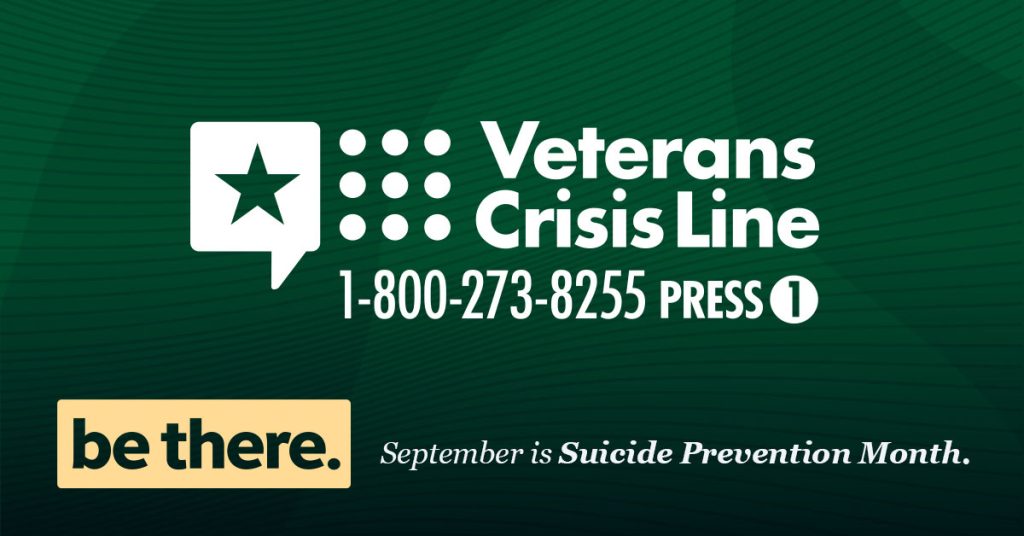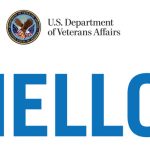September is suicide prevention month and the U.S. Department of Veterans Affairs (VA) is bringing attention to this vital issue by highlighting their Be There campaign. This campaign seeks to remind Veterans and their loved ones that small actions often make a difference to Veterans going through tough times. “There are simple ways anyone can show support for our nation’s Veterans like learning about the VA’s suicide prevention efforts and recognizing the signs that a Veteran may need help,” said VA Secretary Robert Wilkie. “Take a moment to listen with compassion and let Veteran’s know you’re there for them.”
The VA notes several ways that family and friends can help a Veteran in need:
- Reach out to Veterans by sending a check-in text
- Cook them dinner or simply asking them how they’re doing
- Learn about the warning signs of suicide found on the Veterans Crisis Line website
- Watch the free S.A.V.E. training video to learn how to respond with care and compassion if someone indicates they are having thoughts of suicide
- Contact VA’s Coaching Into Care program where a licensed psychologist or social worker will provide loved ones with guidance for motivating Veterans to seek support, sharing stories of hope and recovery from VA’s Make the Connection
In conjunction with promoting it’s Be There campaign, the VA also announced that it recently awarded $1.3 million in grants to 11 homelessness nonprofit organizations to increased suicide prevention services for Veterans who are experiencing or at risk of homelessness. By enlisting several nonprofit organizations, the VA is taking a combined public health approach to decreasing suicide and addressing homelessness.
The VA’s combined approach aims to improve the identification of Veterans in need and connect them to the community and care resources they need. These grants will be disbursed by the VA’s Supportive Services for Veterans Families Program (SSVF) which offers numerous resources to help attain housing for Veterans facing homelessness. Also, the SSVF will provide supportive services, including rapid rehousing and homelessness prevention to Veterans who are at an increased risk of suicide. They will also provide these services to Veterans facing significant hardship due to the COVID-19 pandemic, such as unemployment and unstable finances.
Also, 42 states and one U.S. territory have signed the state proclamation of the Presidents Roadmap to Empower Veterans and End a National Tragedy of Suicide (PREVENTS) pledging to prioritize suicide prevention for Veterans and citizens within their respective jurisdictions. As part of the promotion of the president’s roadmap, the PREVENTS office is involving state and community leaders in all 50 states and territories to make sure that the best practices for suicide prevention are identified and used, and that these efforts are coordinated with the state and federal government.
“With the commitment of our nation’s governors, this undertaking has moved beyond an idea to reality — as it is only viable when governors enlist the full authority and backing of their state to combat this crisis,” said VA Secretary Robert Wilkie. “September is National Suicide Prevention Month and through the outpouring of support echoed by governors issuing state proclamations, their efforts assist with meeting the requirements of the president’s White House Task Force for PREVENTS, which provides the nation with an essential, collaborative forum to address this national crisis through local and state-focused solutions to help us end Veteran suicide.”
While September is suicide prevention month it is important to carry these steps forward to prevent suicides. “Collaborating with state and community leaders to advance the mission of suicide prevention for Veterans and all Americans is imperative,” said PREVENTS Executive Director Barbara Van Dahlen, Ph.D. “As we move forward to change the culture around mental health in general and suicide in particular, we will continue to elevate and amplify the great work our states are area.”
For more information and resources visit va.gov/REACH. If you or someone you know is having thoughts of suicide, contact the Veterans Crisis Line to receive free, confidential support and crisis intervention available 24 hours a day, 7 days a week, 365 days a year. Call 1-800-273-8255 and Press 1, text to 838255 or chat online at veteranscrisisline.net/get-help-now/chat.






